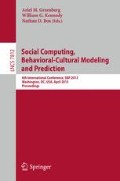Introduction
Increasingly, the relationship between emotion and eating is recognized as an important issue in the study of obesity. Emotions influence food choice behaviors in human beings, but the evidence for the impact of negative and positive emotion on food intake appears to be asymmetric. Negative emotions have been thoroughly studied and there is consensus that they increase food consumption [1]. In addition, there is some evidence that among obese persons characterized as having a negative affect, there is a greater tendency to overeat in response to negative mood induction compared to obese persons characterized as low in negative affect or normal weight control subjects [2].
Access this chapter
Tax calculation will be finalised at checkout
Purchases are for personal use only
Preview
Unable to display preview. Download preview PDF.
References
Canetti, L., Bachar, E., Berry, E.M.: Food and emotion. Behavioral Processes 60, 157–164 (2002)
Jansen, A., Vanreyten, A., van Balveren, T., Nederkoorn, C., Havermans, R.: Negative affect and cue-induced overeating in non-eating disordered obesity. Appetite 51, 556–562 (2008)
Baumeister, R.F., Heatherton, T.F., Tice, D.M.: Losing control: why and how people fail at self-regulation. Academic Press (1994)
Lin, B.-H., Frazao, E., Guthrie, J.F.: Away-from-home foods increasingly important to quality of American diet. Agricultural Information Bulletin 749, 1–22 (1999)
Wheeler, L., Reis, H.T.: Self-recording of everyday life events: Origin, types, and uses. Journal of Personality 59, 339–354 (1991)
Context-aware Experience Sampling Project. MIT, http://web.mit.edu/caesproject/index.htm (last retrieved October 31, 2012)
MacDonald, I.L., Zucchini, W.: Hidden Markov and other models for discrete-valued time series. CRC Press (1997)
Ip, E.H., Snow-Jones, A., Heckert, D.A., Zhang, Q., Gondolf, E.: Latent markov model for analyzing temporal configuration for violence profiles and trajectories in a sample of batterers. Sociological Methods and Research 39, 222–255 (2010)
Zhang, Q., Snow Jones, A., Rijmen, F., Ip, E.H.: Multivariate discrete hidden markov models for domain-based measurements and assessment of risk factors in child development. Journal of Computational and Graphical Statistics 19(3), 746–765 (2010)
Block, G.: Foods contributing to energy intake in the US: data from NHANES III and NHANES 1999-2000. Journal of Food Consumption Analysis 17, 439–447 (2004)
Lu, J., Dube, L.: Emotional reinforcement as a protective factor for healthy eating in home settings. Journal of Clinical Nutrition 94, 254–261 (2011)
Richins, M.L.: Measuring emotions in the consumption experience. Journal of Consmuer Research 24, 127–146 (1997)
Paxton, P.M., Hipp, J.R., Marquart-Pyatt, S.: Nonrecursive models: Endogeneity, reciprocal relationships, and feedback loops. Sage Publication Inc. (2011)
Cooper, M.L., Frone, M.R., Russell, M., Mudar, P.: Drinking to regulate positive and negative emotions: A motivational model of alcohol use. Journal of Personality and Social Psychology 69(5), 990–1005 (1995)
Author information
Authors and Affiliations
Editor information
Editors and Affiliations
Rights and permissions
Copyright information
© 2013 Springer-Verlag Berlin Heidelberg
About this paper
Cite this paper
Ip, E.H., Zhang, Q., Lu, J., Mabry, P.L., Dube, L. (2013). Feedback Dynamic between Emotional Reinforcement and Healthy Eating: An Application of the Reciprocal Markov Model. In: Greenberg, A.M., Kennedy, W.G., Bos, N.D. (eds) Social Computing, Behavioral-Cultural Modeling and Prediction. SBP 2013. Lecture Notes in Computer Science, vol 7812. Springer, Berlin, Heidelberg. https://doi.org/10.1007/978-3-642-37210-0_15
Download citation
DOI: https://doi.org/10.1007/978-3-642-37210-0_15
Publisher Name: Springer, Berlin, Heidelberg
Print ISBN: 978-3-642-37209-4
Online ISBN: 978-3-642-37210-0
eBook Packages: Computer ScienceComputer Science (R0)

